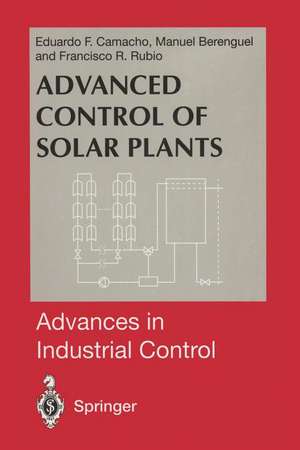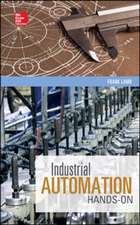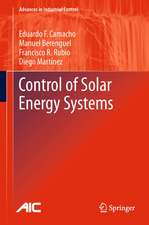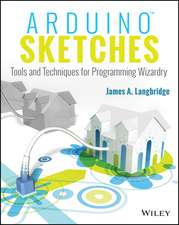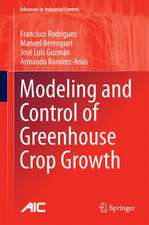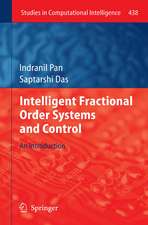Advanced Control of Solar Plants: Advances in Industrial Control
Autor Manuel Berenguel, Francisco R. Rubioen Limba Engleză Paperback – 15 sep 2011
Din seria Advances in Industrial Control
- 15%
 Preț: 643.34 lei
Preț: 643.34 lei - 23%
 Preț: 582.63 lei
Preț: 582.63 lei - 18%
 Preț: 783.98 lei
Preț: 783.98 lei - 18%
 Preț: 947.35 lei
Preț: 947.35 lei - 20%
 Preț: 568.24 lei
Preț: 568.24 lei - 15%
 Preț: 643.16 lei
Preț: 643.16 lei - 18%
 Preț: 899.21 lei
Preț: 899.21 lei - 18%
 Preț: 891.33 lei
Preț: 891.33 lei - 18%
 Preț: 740.57 lei
Preț: 740.57 lei - 18%
 Preț: 961.23 lei
Preț: 961.23 lei - 18%
 Preț: 955.08 lei
Preț: 955.08 lei - 15%
 Preț: 645.28 lei
Preț: 645.28 lei - 15%
 Preț: 638.43 lei
Preț: 638.43 lei - 18%
 Preț: 901.11 lei
Preț: 901.11 lei - 18%
 Preț: 1410.94 lei
Preț: 1410.94 lei - 18%
 Preț: 728.91 lei
Preț: 728.91 lei - 20%
 Preț: 1003.78 lei
Preț: 1003.78 lei - 18%
 Preț: 947.35 lei
Preț: 947.35 lei - 15%
 Preț: 643.34 lei
Preț: 643.34 lei - 15%
 Preț: 654.30 lei
Preț: 654.30 lei - 18%
 Preț: 950.52 lei
Preț: 950.52 lei - 15%
 Preț: 644.30 lei
Preț: 644.30 lei - 18%
 Preț: 1393.09 lei
Preț: 1393.09 lei - 18%
 Preț: 950.21 lei
Preț: 950.21 lei - 18%
 Preț: 949.90 lei
Preț: 949.90 lei - 18%
 Preț: 949.42 lei
Preț: 949.42 lei - 18%
 Preț: 950.52 lei
Preț: 950.52 lei - 18%
 Preț: 1113.71 lei
Preț: 1113.71 lei - 15%
 Preț: 650.04 lei
Preț: 650.04 lei - 15%
 Preț: 644.95 lei
Preț: 644.95 lei - 18%
 Preț: 950.33 lei
Preț: 950.33 lei - 18%
 Preț: 948.61 lei
Preț: 948.61 lei - 18%
 Preț: 1112.60 lei
Preț: 1112.60 lei - 15%
 Preț: 644.63 lei
Preț: 644.63 lei - 18%
 Preț: 953.20 lei
Preț: 953.20 lei - 18%
 Preț: 945.62 lei
Preț: 945.62 lei - 15%
 Preț: 640.88 lei
Preț: 640.88 lei - 15%
 Preț: 640.88 lei
Preț: 640.88 lei - 20%
 Preț: 650.92 lei
Preț: 650.92 lei - 18%
 Preț: 1112.60 lei
Preț: 1112.60 lei - 20%
 Preț: 998.36 lei
Preț: 998.36 lei - 15%
 Preț: 643.34 lei
Preț: 643.34 lei - 18%
 Preț: 948.92 lei
Preț: 948.92 lei - 18%
 Preț: 1381.43 lei
Preț: 1381.43 lei - 15%
 Preț: 651.51 lei
Preț: 651.51 lei - 15%
 Preț: 647.08 lei
Preț: 647.08 lei - 20%
 Preț: 563.66 lei
Preț: 563.66 lei - 18%
 Preț: 992.64 lei
Preț: 992.64 lei - 18%
 Preț: 1225.79 lei
Preț: 1225.79 lei
Preț: 640.55 lei
Preț vechi: 753.60 lei
-15% Nou
Puncte Express: 961
Preț estimativ în valută:
122.57€ • 131.07$ • 102.20£
122.57€ • 131.07$ • 102.20£
Carte tipărită la comandă
Livrare economică 18 aprilie-02 mai
Preluare comenzi: 021 569.72.76
Specificații
ISBN-13: 9781447112495
ISBN-10: 1447112490
Pagini: 300
Ilustrații: XXVIII, 268 p.
Dimensiuni: 155 x 235 x 16 mm
Greutate: 0.42 kg
Ediția:Softcover reprint of the original 1st ed. 1997
Editura: SPRINGER LONDON
Colecția Springer
Seria Advances in Industrial Control
Locul publicării:London, United Kingdom
ISBN-10: 1447112490
Pagini: 300
Ilustrații: XXVIII, 268 p.
Dimensiuni: 155 x 235 x 16 mm
Greutate: 0.42 kg
Ediția:Softcover reprint of the original 1st ed. 1997
Editura: SPRINGER LONDON
Colecția Springer
Seria Advances in Industrial Control
Locul publicării:London, United Kingdom
Public țintă
ResearchCuprins
1.Introduction.- 1.1 The control of solar collector fields.- 1.2 Trends in process control.- 1.3 Modelling and Identification.- 1.4 Adaptive Control.- 1.5 Model-based Predictive Control (MPC).- 1.6 Robust control, frequency domain control and optimal control.- 1.7 Artificial Intelligence Techniques.- 2.Description and dynamic models of the plant.- 2.1 Plant description.- 2.2 Objective of the control system.- 2.3 Data acquisition system.- 2.4 Dynamic simulation models of the field.- 2.5 Analysis of the dynamic response of the plant.- 2.6 Linear plant models.- 3.Basic control schema.- 3.1 Feedforward control.- 3.2 Fixed Ziegler-Nichols rule based PID controllers.- 3.3 Backup controller.- 3.4 Fine-tuned PID controller.- 4.Basic structures of adaptive control.- 4.1 Parameter estimation algorithm.- 4.2 Supervisory levels.- 4.3 Adaptive Ziegler-Nichols rule based PID controllers.- 4.4 Pole-placement adaptive PI controller.- 4.5 Simulation analysis of PID controllers.- 4.6 Plant results with adaptive PI controllers.- 5.Model-based predictive control strategies.- 5.1 Generalized predictive control (GPC).- 5.2 Constrained generalized predictive control.- 5.3 Adaptive generalized predictive control.- 5.4 Robust adaptive model predictive control with bounded uncertainties.- 5.5 Gain scheduling generalized predictive control.- 5.6 GPC scheme with nonlinear prediction of the free response.- 6.Frequency domain control and robust optimal control.- 6.1 Adaptive frequency domain internal model control.- 6.2 Linear Quadratic Gaussian Optimal Control (LQG).- 7.Heuristic fuzzy logic control.- 7.1 Fuzzy logic inference scheme.- 7.2 Incremental fuzzy PI control (IFPIC).- 7.3 Fuzzy logic controller (FLC).- 8.Summary and concluding remarks.- 8.1 Performance indexes.- 8.2 Fixed PID controller.-8.3 Adaptive GPC controller.- 8.4 Robust adaptive GPC controller.- 8.5 Gain scheduling GPC controller.- 8.6 Nonlinear GPC controller.- 8.7 Frequency domain adaptive IMC controller.- 8.8 Robust LQG/LTR controller.- 8.9 Heuristic incremental fuzzy PI controller (IFPIC).- 8.10 Heuristic fuzzy logic controller (FLC).- 8.11 Conclusions.- References.
Textul de pe ultima copertă
There is some degree of separation between the development of advanced control algorithms within the research community and their use in industrial practice. Several strategies developed from experimental research into improving the efficiency of solar thermal power plants are here examined in the context of their industrial application.
The techniques described and applied are:
This is a comprehensive analysis of the practical application of different control strategies that will be of interest to control engineers working in solar power systems and throughout other process industries, and to researchers, scientists and graduate students in this field.
Advances in Industrial Control aims to report and encourage the transfer of technology in control engineering. The rapid development of control technology has an impact on all areas of the control discipline. The series offers an opportunity for researchers to present an extended exposition of new work in all aspects of industrial control.
The techniques described and applied are:
- modeling and simulation;
- adaptive control;
- model-based predictive control;
- frequency domain control and robust optimal control; and
- fuzzy logic control.
This is a comprehensive analysis of the practical application of different control strategies that will be of interest to control engineers working in solar power systems and throughout other process industries, and to researchers, scientists and graduate students in this field.
Advances in Industrial Control aims to report and encourage the transfer of technology in control engineering. The rapid development of control technology has an impact on all areas of the control discipline. The series offers an opportunity for researchers to present an extended exposition of new work in all aspects of industrial control.
